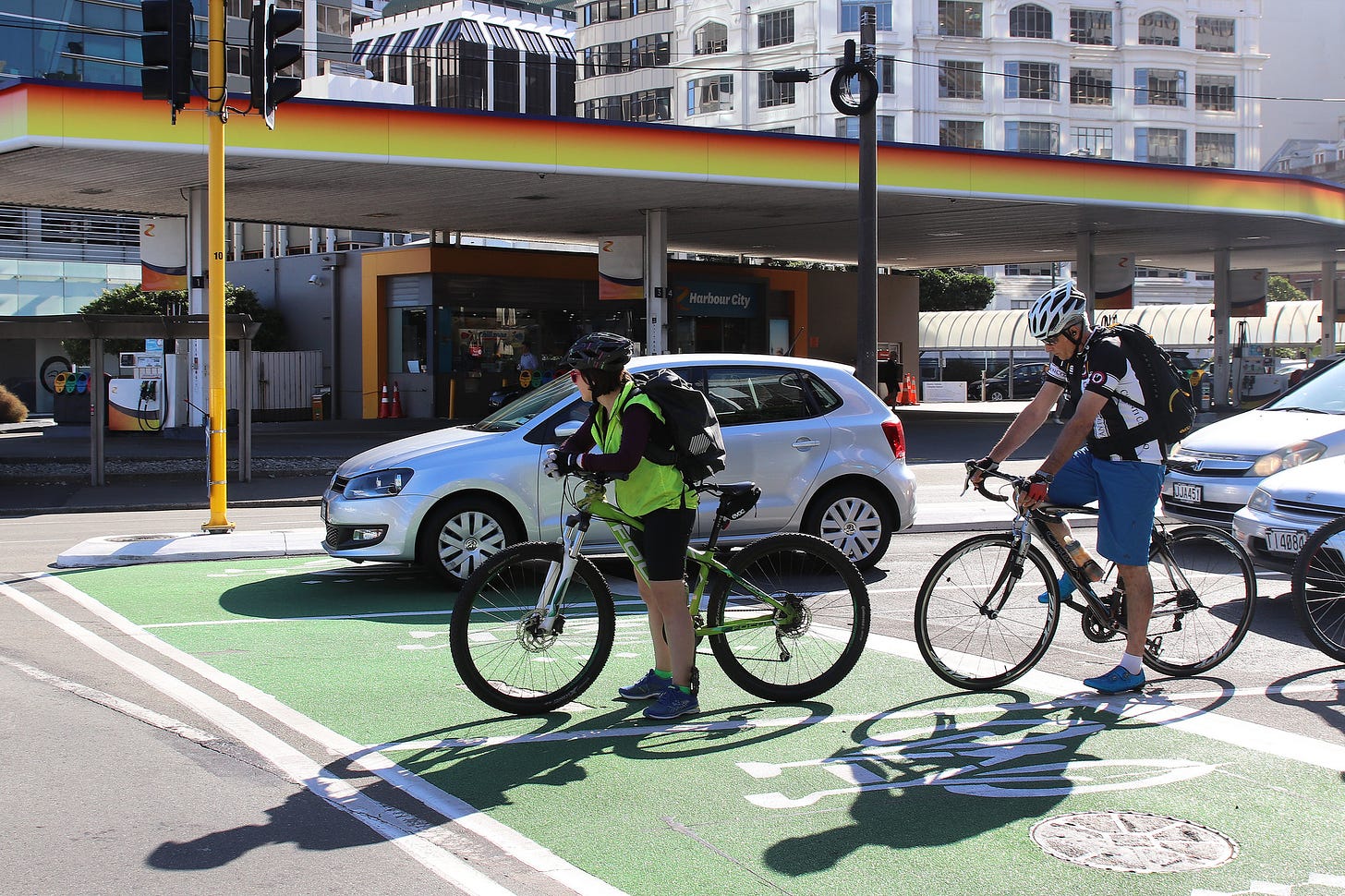
TL;DR: Transport Minister Simeon Brown has written to regional councils and told Waka Kotahi-NZTA to immediately stop cycling and walking projects paid for from the Climate Emergency Response Fund (CERF), which the National-ACT-NZ coalition is using to pay for early tax cuts for landlords. RNZ Robin Martin, Newsroom Marc Daalder
The projects costing $22.5 million were designed to help achieve the previous Government’s Emissions Reductions Plan plan to reduce Vehicle Kilometres Travelled (VKTs) by light vehicles by 20% by 2035 vs a no-change baseline, which would mean a significant number of urban trips would have to shift to cycling, walking and buses from cars. The VKT targets were designed to reduce carbon emissions by 13.4 million tonnes by 2035, helping Aotearoa-NZ towards meeting its Paris target agreements and avoiding up to $23 billion of overseas emissions credits spending by taxpayers.
To save $22.5 million now and to pay for $2 billion worth of early tax cuts for landlords over the next 18 months, the new Government is risking creating a $24 billion liability for future taxpayers and Governments, or a default on our international trading agreements that would lock farmers’ exports out of Europe.
The cycling and walking project cancellations came as the Government followed through on its election promise to stop Let’s Get Welllington Moving, a collection of projects designed to encourage use of buses, light rail, cycling and walking in Wellington. Instead, the Government plans to spend $2.2 billion building a second tunnel for cars through Mt Victoria.
Elsewhere in the news this morning:
Wellington Regional Council has warned councils they face water limits and extra charges because they’ve failed to bring in water meters to help fund billions of catch-up investment needed in the absence of Three Waters; The Post-$$$ Nicholas Boyack
Trade Minister Todd McClay is travelling to India this week with the hope of restarting trade agreement talks, but faces a tough task as India doesn’t want to let in our dairy exports. Today, New Zealand’s largest sheepmeat exporter, Alliance Meats, was reported to have called on McClay to exclude dairy from the deal to allow meat exporters into India; and, The Post-$$$ Tina Morrison
Global shipping giants Maersk, CMA CGM, MSC and Hapag-Lloyd announced over the weekend they had stopped travelling through the Red Sea and therefore using the Suez Canal because of drone and missile attacks by Houthi rebels funded by Iran. About 30% of the world’s shippin goes through the Suez Canal and would have to travel more expensively around the Cape of Good Hope. Meanwhile 5% of global trade passes through the Panama Canal, but passages are limited at the moment because of drought worsened by climate change. Reuters
Usually at this point in the edition, there’s a paywall that only paying subscribers can see below and hear more detail and analysis in the podcast above. But we’d love you to join the community of paying subscribers, who can read and comment on everything inside the paywall all the time and get access to our weekly ‘Hoon’ webinar on the news of the week on Thursdays at 5pm here via YouTubeLive for an hour. The 50%-off offer is open to new subscribers until December 21 (Wednesday).
And here’s a special, special deal for under 30s.
Also remember that anyone who is a student or teacher with a .school.nz or .ac.nz email address can sign up for the free version of The Kākā and will be upgraded to the full paid version for free.
Tax cuts paid for by increasing deaths and emissions
There’s a clear line now between the Government’s plans to pay for early tax cuts for landlords with various measures that are likely to increase the number of deaths from speeding cars, unhealthier commuters and extra smoking, along with more climate emissions from the extra kilometres traveled in cars and trucks on higher-speed roads that would otherwise have been travelled on low-emissions buses, bikes and footpaths.
The National-ACT-NZ First Government is repealing SmokeFree changes to ensure an extra $900 million in tobacco excises are available to help pay for over $2 billion of tax cuts to be accelerated for landlords over the next 18 months. That will lead to thousands of deaths, hundreds of millions in extra health costs and lost productivity gains from having fewer smokers.
It has also cancelled billions of dollars in capital spending on public transport projects to free up room for tax cuts and reduce borrowing, in order to reduce interest rates so that median-voting residential land owners get the benefit of more leveraged and untaxed capital gains.
The irony is that the various measures to save money and deliver ‘cost of living relief’ to taxpayers through tax cuts in the short term, will cost many billions more in health costs, lost income tax revenues and overseas emissions spending in the long run. None of these decisions are being made with long-run analysis of the true costs and benefits, or being made with the discipline of taking into account up to $24 billion of emissions credits needed to meet our Paris agreements, but not included as a contingent liability in the Crown Accounts.
RNZ’s Robin Martin and Newsroom’s Marc Daalder reported over the weekend on a letter sent by Transport Minister Simeon Brown to regional councils and Waka Kotahi-NZTA last week that effectively cancelled new cycling and walking investment from CERF funds.
“I understand that some local authorities have been developing programmes with NZTA and other stakeholders to reduce vehicle kilometres travelled (VKT) by the light vehicle fleet, using funding from the Climate Emergency Response Fund,” Brown wrote, in a copy of the letter seen by Newsroom.
“I have given notice to NZTA to end its work on these programmes, and to not commit any further funding to local authorities (beyond existing contractual obligations) to develop these programmes.”
Brown went on to describe the programmes as a ‘waste of time.’
“The VKT programmes I have asked NZTA to end work on were previous government policy and simply amounted to millions of dollars being spent writing endless reports with no funding allocated to any delivery. This was typical of the last government’s approach to transport,” he told Newsroom.
“My focus will be on building and maintaining the roading network which is critical to having a safe, efficient and productive transport network.”
The problem, as outlined by Marc Daalder, is that the programmes are needed for New Zealand to meet its emissions reductions targets.
As part of the previous government’s Emissions Reduction Plan, a national target was set to reduce total kilometres travelled by the light fleet in 2035 to 20 percent below baseline projections. This meant roughly flatlining the total distance travelled by passenger cars over the next 12 years, even while the population was expected to grow significantly.
This would be done through setting specific targets for a reduction of vehicle kilometres travelled in major urban and provincial centres, which would be enabled through increasing the accessibility of walking, cycling and public transport as opposed to travelling by car.
In its initial advice in 2021, the Climate Change Commission specifically encouraged the Government to work with local government in “setting targets and implementing plans to substantially increase walking, cycling, public transport and shared transport use to displace vehicle use”.
In March, then-Prime Minister Chris Hipkins scrapped plans to set kilometre reduction targets for medium-sized urban areas like Napier and Dunedin. However, officials in July were on track to finalise delivery plans and funding agreements for the programme in five major cities: Auckland, Wellington, Christchurch, Tauranga and Hamilton
Brown didn’t answer when asked whether the Government was scrapping the kilometre reduction targets for the five big cities or the national 20 percent target.
In January, officials estimated the collective impact on carbon pollution of achieving the targets would be 13.4 million tonnes of greenhouse gases. That’s 42 percent of the emissions reductions the entire transport sector needs to achieve by 2035 in order to meet New Zealand’s climate targets.
Here’s an excellent chart via Marc showing the effects.
Auckland Councillor Maurice Williamson challenged Marc’s reporting via X, which Marc responded to:
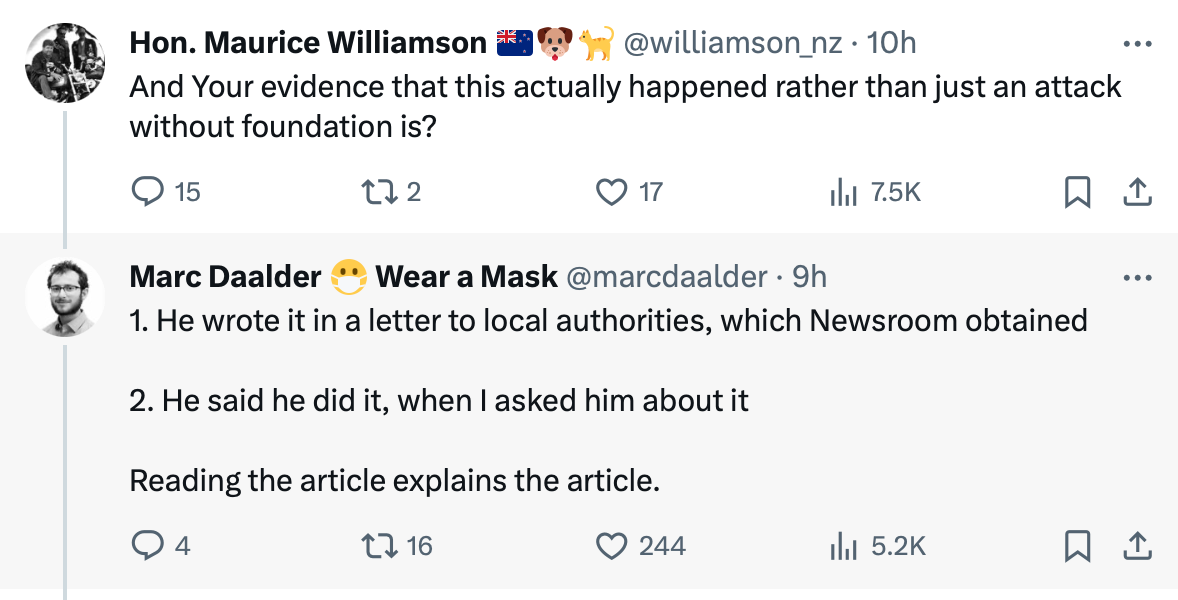
Ka kite ano
Bernard




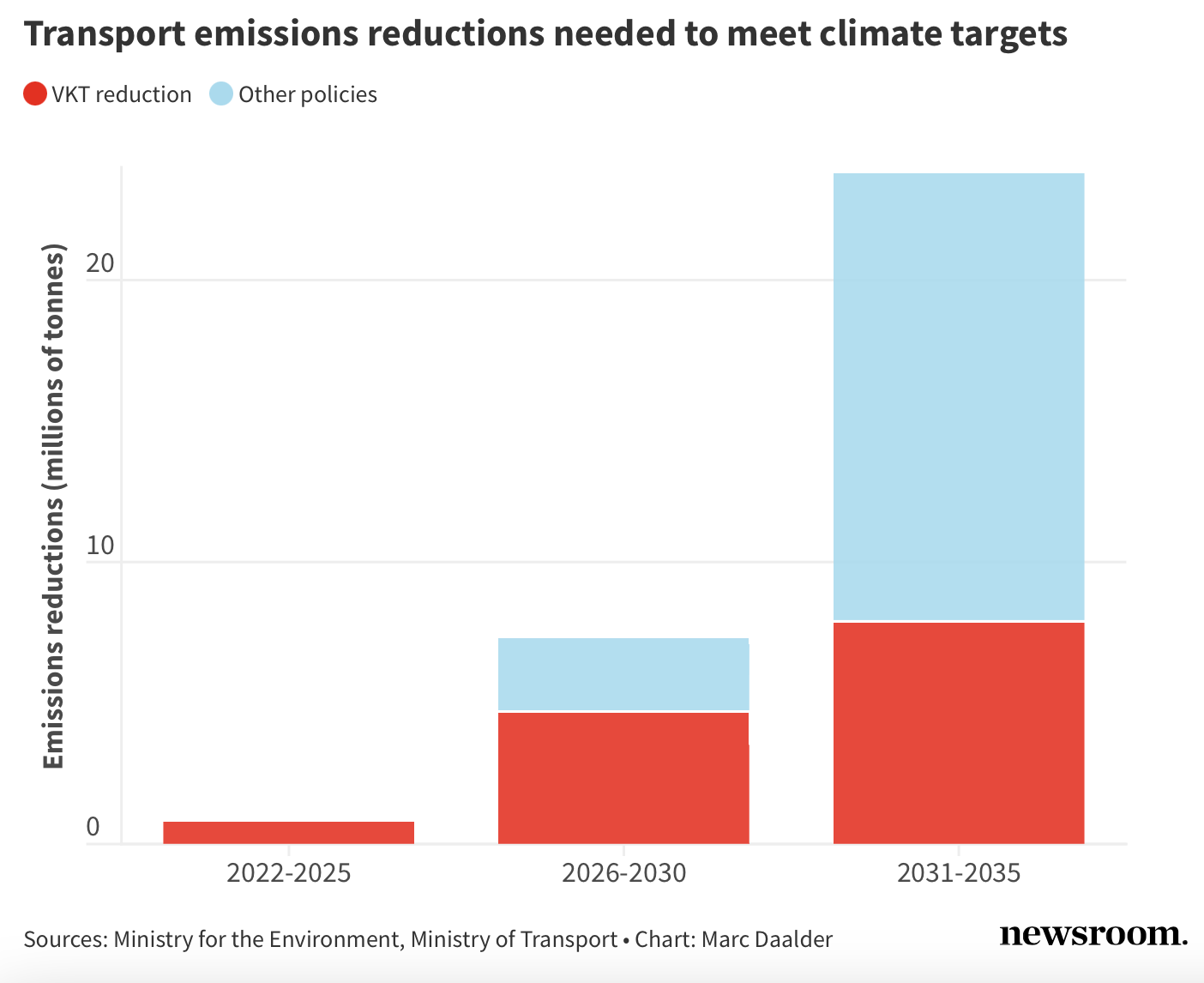



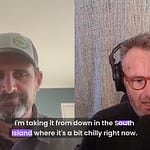
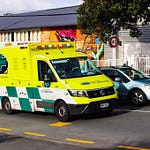





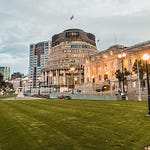
Govt bans cycling & walking projects to help fund tax cuts